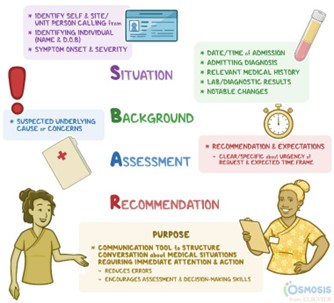When preparing to administer medications, the nurse carefully confirms the drug order and the patient's identity. This adherence to an essential ethical principle is:
Maleficence
Non-maleficence
Veracity
Justice
The Correct Answer is B
When preparing to administer medications, the nurse carefully confirms the drug order and the patient's identity. This adherence to an essential ethical principle is Non-maleficence. Non-maleficence refers to the principle of "do no harm" and requires healthcare providers to avoid causing harm to their patients.
Option A refers to wrongdoing or misconduct and is not applicable in this situation.
Option C refers to truthfulness and honesty, but it is not the primary principle being demonstrated in this situation.
Option D refers to fairness and equality, but it is not the primary principle being demonstrated in this situation.
Nursing Test Bank
Naxlex Comprehensive Predictor Exams
Related Questions
Correct Answer is ["A","B","C","E"]
Explanation
SBAR stands for Situation, Background, Assessment, and Recommendation. It is a systematic method of communication that provides a structured framework for conveying important information about a patient. To ensure that the report is thorough, the nurse needs to include information about the situation of the patient, the background leading up to the situation, an assessment of the patient, and recommendations for moving forward.
Option d is incorrect because barriers to providing treatment are not part of the SBAR framework.
Option f is incorrect because the reason why the report is needed is not part of the SBAR framework.

Correct Answer is C
Explanation
In this situation, the nurse's failure to administer Mr. Smith's medication on time as ordered, resulting in harm to the patient, could be considered malpractice. Malpractice refers to a failure to meet the standard of care that results in harm to a patient.
Option A refers to legal responsibility for one's actions, but it does not specify the type of wrongdoing.
Option B refers to wrongdoing or misconduct, but it is not specific to the medical profession.
Option D refers to a failure to fulfill one's duties or obligations, but it does not necessarily imply harm to a patient.
Whether you are a student looking to ace your exams or a practicing nurse seeking to enhance your expertise , our nursing education contents will empower you with the confidence and competence to make a difference in the lives of patients and become a respected leader in the healthcare field.
Visit Naxlex, invest in your future and unlock endless possibilities with our unparalleled nursing education contents today
Report Wrong Answer on the Current Question
Do you disagree with the answer? If yes, what is your expected answer? Explain.
Kindly be descriptive with the issue you are facing.
